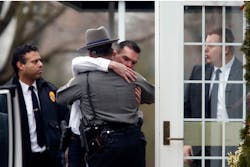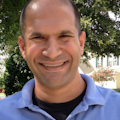The massacre at Sandy Hook Elementary School on Dec. 14, 2012, left 20 students and six adults dead, but also left deep emotional scars for the police officers who responded to the incident.
The sights they witnessed that day after 20-year-old Adam Lanza went on the rampage with a high-powered, military-style rifle will take time to come to grips with, and efforts continue to be made in their recovery four months after the incident.
Newtown Police Chief Michael Kehoe told Officer.com that all but one officer has returned to work since that tragic day.
"Some of our officers have been out intermittently, which is understandable, but for the most part, most of them have come back to work and are leading very productive, professional lives," he said.
"Many of them continue to get services that are being offered to them and I've encouraged them to do that as long as necessary."
The need for counseling was obvious on day one, and swift action was made to make sure services were offered.
"It never hurts to talk about things," Kehoe said. "In this case, the more you talk about it, the more you understand the effects it has on a person."
Offering Help
Counselors were brought in on the first day to allow the officers begin the process of recovery as soon as they could.
"It was heartwarming to know that our EAP people were available that day to meet with all of the officers coming in on shift, talk with them and certainly deliver some services at that time and down the road for any other services they may need," Kehoe said.
The officers were generally open to accepting counseling following the incident, according to the chief.
"I'm sure there were some who weren't so readily open and available, but others were," he said. "Everybody is different. Not everybody is going to need the same level of care and service, so you have to understand that some may want to continuously get some kind of care and service and others will just kind of move on."
The Newtown Police Department had never responded to an incident of this magnitude before and getting help for its officers proved to be a challenge.
"It's something we had to deal with on the fly," Kehoe said. "This was an overwhelming event affecting many, many officers, not only from our agency."
He said that first responders were also affected, as well as the community at large.
"The mental health aspect of this event was overwhelming for our region and for the state of Connecticut," he said. "It became a challenge to try to meet all of those needs."
A Helping Hand
Kehoe said that he will be forever grateful for the help offered by the state police and neighboring departments to allow officer to take time off to grieve.
"That was so important for our officers to do that. We can't thank Connecticut law enforcement enough for the time that they gave us and the cooperation they gave us," he said.
Not only did neighboring departments offer help in the days following the incident, but also arranged to give the entire Newtown police force Christmas Day off.
"That was something unusual in our state to have happen," Kehoe said of the incident. "The fact that Connecticut State Police and local law enforcement pitched in to give their services to our community was so, so important."
Coping as the Chief
Kehoe said that as the chief, his first concern will always be with his officers and to make sure they are getting the help they need.
While he said he's been able to cope well with the tragedy himself, he admitted that over the course of his 34-year career in law enforcement he's seen a lot, but that nothing came close to what occurred on Dec. 14.
"I think I've been able to cope with and resolve some of those lingering issues that I had from that day, and I think I've moved forward," he said.
For other officers who find themselves involved in a critical incident, Kehoe stressed the importance of seeking someone to talk to about what they are going through.
"I think it's really, really important that officers don't have a machismo attitude and think that they don't need help," he said.
"I would encourage all officers who come across a critical incident like this to seek out somebody they are comfortable with, someone who is trained professionally, to talk about it."
About the Author
Paul Peluso
Editor
Paul Peluso is the Managing Editor of OFFICER Magazine and has been with the Officer Media Group since 2006. He began as an Associate Editor, writing and editing content for Officer.com. Previously, Paul worked as a reporter for several newspapers in the suburbs of Baltimore, MD.

